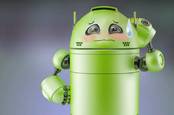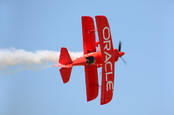This article is more than 1 year old
Happy as Larry: Why Oracle won the Google Java Android case
Get a licence or build something new. It's really that simple
Comment One piece of paper. Just one lousy piece of paper. That's the difference between success and a potential $8.8bn payout.
Google's lucky streak finally ran out this week. Its defense for using Oracle's copyrighted Java code in Android – without paying the database giant a penny in royalties – collapsed in a US Federal appeals court, just as I predicted it would in 2016. Why was I so confident back then that Oracle would prevail?

Java-aaaargh! Google faces $9bn copyright bill after Oracle scores 'fair use' court appeal win
READ MORECopyright can be incredibly detailed and complicated, nightmarishly so when there are overlapping bundles of rights, as in music. But the principles of intellectual property are always straightforward, and this is what judges must ultimately consider. And this was a very straightforward case. Google didn't have that one vital bit of paper.
Google had copied Sun Microsystems' Java – it took the technology then built useful new bits on it for Android – without a license. Internally, Google's Android team knew they should get a license and said so, but Sun, which at the time was in its Kumbaya era under its ponytailed CEO Jonathan Schwartz, hadn't got round to getting Google's signature on the paperwork. Then Oracle supremo Larry Ellison acquired the rights to Java, and Larry is emphatically not a Kumbaya sort of person. A piece of paper is required to keep someone like Larry at bay, and Google didn't have that piece of paper.
Appeals court judges tend to uphold rulings on intellectual property, not because of some evil conspiracy, but because that's what the law requires judges to do. A court cannot hinder copyright law. Don't like it? That's OK. Change the law.
The judges considered the merits of Google's defense, and the defense alone, and you should too. Discount all the diversions raised by the PR folk, the academic activists, the lobby groups, and that Random Concerned Fella on Twitter with an Opinion. I'm afraid too few people did that, as the speculation was sexier than the facts.
Specifically, the alarm was raised far and wide that an Oracle win would set back fair use, or lead to the copyrighting of software-to-software interfaces (otherwise known as APIs).
Once again, it's helpful to turn to the law. Here's how I explained it a couple of years ago. APIs have always fallen under copyright, but just because you have something copyrightable does not mean you will ever assert it successfully. In US copyright law, the creative expression is what's copyrightable. You can attempt to assert copyright over a few words – which is really what SCO was attempting to do with Unix – but if it's not a substantial and original expression, you'll fail. And you shall pay for your self-indulgence.
So Oracle was on firm ground, as Java ticked the boxes required: it was, to use the technical terms, an original work of authorship fixed in a tangible medium of expression.
Firm ground is something Google wasn't on. After a few trips round the houses – it had tried to throw out Oracle's copyrightability claims – Google settled on the affirmative defense known as fair use.
Fair use has an unusual and far more significant role in US copyright law than it does in any other legal system, and Google would like to see it written into global law, but that's a story for another day. As the Federal Court notes in its judgement, Google had a high hurdle to cross: “Because fair use is an affirmative defense to a claim of infringement, Google bears the burden to prove that the statutory factors weigh in its favor.”
Fair use has hurdles
Here's why Google failed. The burden was now on Google to show that constructing Android from Java was fair use. Google had to address four factors.
Was the new work a transformation of previous material, or copied verbatim? What was the nature of the work – was it factual or fictional, or based on unpublished material? Was the amount copied reasonable or substantial? And did it affect the market value of the original?
Google's luck came in the shape of Judge William Alsup, who directed a trial jury very narrowly into conducting a referendum on whether fair use was a good thing or not. In effect, he was marking his own homework. But that luck ran out. Each of the four factors weighed heavily against Google.
Make your own damn operating system
Google clearly had the choice of making a cool new OS, or getting a Java license and building on that. The ads giant is, right now, working on a cool new OS called Fuchsia that's hopefully lawyer-proof, and we can expect to hear a lot more about it.
To sum up, then: Google knew it needed a licence, didn't get one, and tried to bluff it out.
We journalists have all been guilty of raising the alarm at some time, and in a sense that's part of our social function, to do just that. So I'm not throwing rocks today. But in this case, all the out-of-courtroom FUD seemed to cloud public opinion somewhat, as the disparity between tech opinion ("unbelievable decision – awful – alarming") and IP experts ("Of course – what else was the court going to do?") suggests. One sees the law as it wishes it would be, and one sees the law as it actually is.
I don't know if Oracle's lawyers have a sense of humour, but $8.8bn covers the purchase price of Sun Microsystems, which was $7.4bn, and with some spare change left over to buy, say, a pretty decent yacht. ®
Related link
The judgment is here (PDF).

